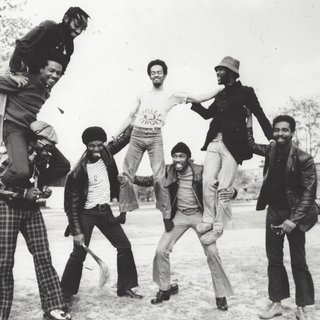In 2015 Cymande released A Simple Act of Faith – the band’s first new album in 41 years. In 2016 they completed a short tour of the United States, where they had not played since 1973. And in March of 2024, 51 years after their first release, Cymande is touring Australia for the first time ever.
Hannah Galvin sat down with the group on Solstice to discuss their legacy and ongoing impact as one of Britain’s greatest but perhaps most underground funk bands.
It’s hard to fully grasp the significance of Cymande’s musical and cultural impact. Their music, which upon release was relatively unrecognised, has become a crucial touchstone for the development of entire subgenres of music. Cymande are also iconic for remaining staunch and refusing to become what they called a “cover band,” instead valuing social consciousness and maintaining a clear vision in their music. Of course, the explicit intertwining of politics and music was a luxury already granted to their white counterparts.
“As black musicians in the United Kingdom you were told that to succeed in the music business was to play that popular stuff – to go on the bandwagon and do what John and Fred and Bill and Sue and whoever else were doing in the pop arena.”
Early hip-hop DJs deconstructed Cymande’s songs and used them as breakbeats, and the British rare groove scene of the 1980’s was openly influenced by the group. When asked by Hannah how it felt that “many parallels have been drawn from a myriad of genres throughout music history, always coming back to Cymande as the basis” they replied, at first with a simple “good.”
“I don’t mean it in a simplistic way. Because you’re not looking for that. We weren’t looking. We weren’t seeking to be pioneers. We were just trying to make original music and have people appreciate that.”
The longevity and prevailing importance of Cymande’s music comes from exactly that – its heartfelt originality. By stepping outside the parameters of the time they were working they inadvertently made something timeless. Having recently seen Khruangbin perform at the Opera House and witnessing similar contemporary groups growing to worldwide fame, I can undoubtedly see the influence of Cymande continuing to permeate modern music.
“It’s a wonderful time for us. At this stage of our life to see our music being recognised in a way we had hoped it would have been recognised in the 1970s, you know, it’s so wonderful. I find it difficult to put into words how it makes me feel to be experiencing this at this time of my life.”
In a time where instant gratification and material success pretty much go hand in hand it’s pretty crazy to hear Cymande speak so forgivingly about the credit they are clearly long overdue. They had an equally calm and even appreciative reaction when Hannah mentioned the many artists (De La Soul, The Fugees, to name a few) that sampled their work despite leaving them uncredited. Somewhat ironically, despite being professionally equipped to seek all the retribution that most artists would have without a second thought (both Steve Scipio and Patrick Patterson are lawyers), Cymande expressed no strong desire to do so.
“I’m very happy to see the creativity used by young people in relation to our music. At the time these young men were developing this wonderful craft of sampling and making their own thing, people weren’t thinking about who owned the bit of music that you were plucking out to make your own stuff. So you have to give them a break in that sense and applaud them at the same time for their creativity.”“I don’t have a problem with it because the sampling of our music has given this second phase to Cymande, the second phase of life.”
I for one hope that this second phase is not the last. I’m almost certain that it won’t be; music like Cymande’s comes back time and time again. Even if at times it lies unnoticed, seeding countless other sounds (like it did in their 40 year hiatus), it’s destined to break through the musical soil and and once again flower.
Words by Madi Martin-Bygrave
